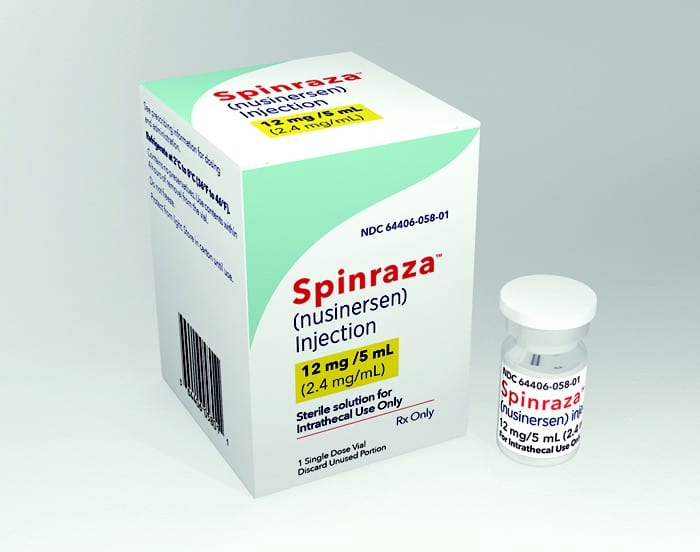
NHS England has agreed a ‘managed access’ deal with Biogen for its spinal muscular atrophy (SMA) drug Spinraza, which the health service budget holder says is one of the most comprehensive in the world.
The announcement is the latest sign that NHS England’s new hard bargaining but speedy approach to price talks is helping to accelerate market access in the country – even though pharma companies have to make some major price concessions behind closed doors.
Spinraza was first appraised by cost effectiveness watchdog NICE in August 2018, but uncertainties about its long-term clinical benefits and its high list price – £450,000 for the first year and £225,000 for subsequent years – saw it rejected.
Now, NHS England has stepped in once again to negotiate – giving both sides the room for manoeuvre, which was missing when a NICE ‘no’ was the end of the discussion – a situation which now appears to be a thing of the past.
The managed access agreement means the NHS will fund treatment for a time-limited period, allowing further data to be collected on its effectiveness. This approach is very similar to the NICE-run Cancer Drugs Fund (CDF), but it is currently limited to oncology treatments, though details of the Spinraza agreement haven’t been disclosed as yet.
The agreement paves the way for NICE to formally approve the treatment for use with eligible patients via its usual final guidance.
The treatment will be made available to the youngest and most severely-affected (SMA type 1) patients immediately by Biogen, with NHS England offering funding on NICE’s publication of final guidance.
For older babies, children and young adults with less severe symptoms (SMA types 2 and 3), the NHS will begin to provide nusinursen shortly after NICE’s guidance is published, once the services to deliver them are established.
This is in line with NICE’s usual processes, and NHS England says won’t take more than a few weeks.
Simon Stevens, NHS England chief executive, said: “This promising treatment has the potential to be life changing for children and their families.
“This is one of the most comprehensive deals in the world, meaning all relevant SMA patients (SMA 1,2,3a and 3b), including adults and siblings who are yet to show symptoms, will be able to benefit from this treatment.
“This latest deal coming on the heels of a number of other recent successful negotiations demonstrates that there is no reason for other companies not to show equivalent flexibility in order to benefit NHS patients, taxpayers and indeed themselves.”
Terry O’Regan, vice president and managing director of Biogen UK and Ireland, said:
“The NICE recommendation of nusinersen for infants, children, and adults with 5q SMA, including pre-symptomatic, SMA types I, II and III, is a momentous occasion for patients and their families who have fought tirelessly for access to this life-changing medicine.
“This positive outcome has been achieved through intensive and collaborative working between the SMA community, NICE, NHS England, and Biogen.”
He concluded: “We will continue to work with health authorities to ensure this welcome decision translates into access as soon as possible for those awaiting treatment, which includes providing NHS England with access to nusinersen for type I patients immediately.”
The breakthrough in England comes at a pivotal time in SMA treatment, as two competitors to Spinraza are waiting in the wings – Roche’s oral treatment risdiplam and Novartis’ gene therapy Zolgensma.
The arrival of these rivals in 2021 and 2020 respectively is good news for payers, and gave the talks in England extra impetus for both Biogen and NHS England.
Since its launch in 2016, Spinraza has become Biogen’s biggest growth driver, and generating $518m in revenues in the first quarter of this year.
NICE still needs reform
Despite the relief at a breakthrough – especially for patients and their representatives – there remain calls for reform of NICE’s appraisal system to avoid similar problems in the future.
Campaigners say one of the major flaws in the system was that Spinraza was appraised through NICE’s Single Technology Appraisal (STA) route – that’s because the condition has too high a prevalence to go through NICE’s highly specialised technology (HST) route, which is reserved for the rarest orphan and ultra-orphan treatments. Patient groups say the health economics of a rare disease like SMA make it highly unlikely to be passed through NICE’s STA, however.
Muscular Dystrophy UK points out that Spinraza is only the second drug that has been appraised through this pathway to be approved for a managed access agreement.
It and Spinal Muscular Atrophy UK say they will continue to push for changes to the appraisal process for rare disease drugs.
In the meantime, they are calling on NICE to formally recommend the treatment and for Biogen and NHS England to urgently implement the MAA so patients can access the drug quickly, and for Wales and Northern Ireland, which generally follows NICE’s guidance, to follow suit.
Catherine Woodhead, chief executive of Muscular Dystrophy UK said:“Every day counts for people with SMA, and we need to ensure this decision is implemented as soon as possible, and made available UK-wide. Our work here is not done.”
She added: “The lengthy, frustrating delays which we have seen throughout this process must not be allowed to happen again. During this time, there will have been irreversible decline in SMA patients’ health. The appraisal system for new treatments for rare diseases needs to be urgently overhauled to make it fit for purpose for future treatments for rare conditions.”




